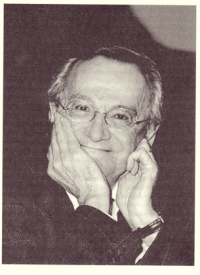Jean-François Lyotard
From Geography
Jean-François Lyotard (1924 - 1998) was born in France and studied in Paris. He was a philosopher and (in the first part of his life) a Marxist activist. He was an important man for the development of post-modernism. His most important post-modern work is The Postmodern Condition.
Contents |
Life
Jean-François Lyotard was born in 1924 in Versailles, France. After finishing his studies at the Sorbonne, he married his first wife Andrée May in 1948, with whom he would have two children. In 1950 he became a teacher of philosophy in Constantine, French East Algiers, teaching at a secondary school. In 1952 he moved back to France where he continued to work within the same profession.
Politics
After his experiences in Constantine, Algiers, which made a great impression on Lyotard, he becomes motivated to be politically involved. In 1954 he becomes a member of 'Socialisme ou Barbarie' a Marxist activist association. In 1964 he leaves them to join 'Pouvoir Ouvrier', a separation of 'Socialisme ou Barbarie'. In 1966 he finally quits Marxist activism after six years of dubiety. After this, the only time he was politically active again was in the May days of 1968.
Academical life
In 1959 Lyotard starts teaching at different universities in Paris, such as the Sorbonne, Saint-Denis, Vincennes and Nanterre, his specialism being the esthetics. In 1971 he achieves his Ph.D in literature with his dissertation Discours, figure. Lyotard was co-founder and head of the 'Collège Internationale de Philosophie'. His fame as a post-modernist philosopher came after publishing La Condition postmoderne in 1979.
In 1993 he marries to Dolores Djidzek, his second wife, together with her he would get another son in 1986.
Lyotard dies from leukemia in 1998.
The philosophical debate of post-modernism
As before he was still an unknown philosopher, after publishing La condition postmoderne Lyotard was the initiator of the international debate on post-modernism, in which also Jürgen Habermas and Richard Rorty participated. Although the term post-modernism had been used before (i.g. in literature), Lyotard was the first one to apply this on science and philosophy.
According to Lyotard, modernists such as Georg Wilhelm Friedrich Hegel, Immanuel Kant and Karl Marx "legitimised scientifical knowledge by embedding or including them in a greater storie about historical progression" (van Peperstraten, F., 2008, p.237). In scientific post-modernity there is no more belief in such stories, argues Lyotard. In his opinion, "the dynamics in science are due to the paradox, incomparability and undecidability"(van Peperstraten, F., 2008, idem). To describe these previous three factors all together, Lyotard uses the term paralogy, which addresses heterogeneity and/or differentiality (van Peperstraten, F., 2008, idem).
Bibliography
- 1971. Discours, figure. Paris
- 1974. Economie libidinale. Paris
- 1979. La condition postmoderne. Rapport sur le savoir. Paris
- 1983. Le différend. Paris
- 1986. Le postmoderne expliqué aux enfants. Paris
- 1986. L'enthousiasme. La critique kantienne de l'histoire. Paris
- 1988. Heidegger et 'les juifs'. Paris
- 1988. L'inhumain. Causeries sur les temps. Paris
- 1993. Moralités postmodernes. Paris
- 1998. La confession d'Augustin. Paris
- 2000. Misère de la philosophie. Paris
References
- van Peperstraten F., (2008). Jean-François Lyotard. In Doorman, M. & Pott, H. (Eds.) Filosofen van deze tijd. (pp. 237 - 251) Amsterdam: Uitgeverij Bert Bakker (Reprinted from 2000)
Contributers
- Page enhanced by Isis Boot - --IsisBoot 14:47, 24 October 2012 (CEST)
- Page edited, picture and links added by Isis Boot - --IsisBoot 14:47, 24 October 2012 (CEST)
